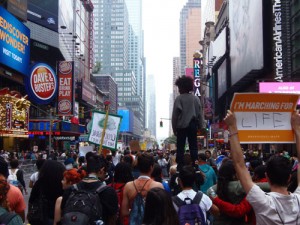By Alex Papali, Organizer : Green Justice Campaign and Boston Recycling Coalition - follow the Boston office on Twitter (@CleanH2OMA)
The People’s Climate March in Manhattan last month was hailed as a watershed moment for the fast-growing climate movement. Yet fewer people see themselves as environmentalists today than in decades past. An estimated 20 million Americans, for example, participated in the first Earth Day in 1970, credited with building the grassroots pressure that led to the Clean Air Act, Clean Water Act and other fundamental environmental protections we enjoy today.
An honest assessment may well show that the lower numbers of self-identified environmentalists today is because being green is perceived as the province of affluent whites who don't have to deal with the immediate needs of real life, or as coming at too high a cost to society’s economic health. But the class and race diversity readily apparent at the New York march show that these attitudes are changing quickly. Every day more people understand the economic benefits that come with low-carbon energy production, or the power of investing in local control of energy, food and other systems instead of the expensive and undemocratic status quo.
Low-income communities of color have long endured toxic pollution disproportionately, and this pattern will worsen as the climate crisis spawns ever-nastier droughts, superstorms and heatwaves. So it was fitting that indigenous, environmental justice and other frontline communities were at the very front in Manhattan, leading the entire march. Environmental justice allies like Chelsea Collaborative and Alternatives for Community and Environment did great work in the Boston area to build participation from communities previously absent in these mobilizations.
And a massive transition is under way, despite obstructionism from some elected officials that borders on criminal. Solar, wind, energy efficiency and other clean energy technologies are being embraced broadly and hold the power to turn the planet away from the climate cliff, while community ownership and fair workplaces in these systems can reinvigorate failing local economies if implemented wisely. The choice is seizing the moment and leading our communities towards healthy economies and vibrant ecosystems, or watching business as usual take us down the inevitable path to catastrophe. For now it looks like we are moving in the right direction.
A growing chorus is calling for bold climate solutions, but ultimately, to be effective this emerging movement must challenge the fundamental inequities in our society’s structure. It remains to be seen whether our generation will find ways to cooperate and tolerate a diversity of ideas, tactics and cultures, so we can channel all our strengths into meeting the challenge of our lifetimes.



